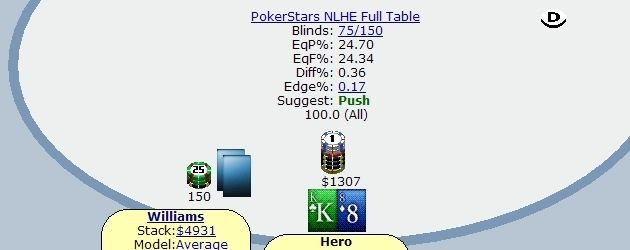Poker Independent Chip Model
In poker, the Independent Chip Model (ICM) is a mathematical model used to calculate a player's overall equity in a tournament. The model uses stack sizes alone to determine how often a player will finish in each position (1st, 2nd, etc.). CrunchyNut’s Independent Chip Model by Tyson Tanaka Oct 19, 2020 Poker Strategy, SNG 0 comments By request, I’ma try to lay down a more in depth explanation of ICM and what it could mean for your poker play. Independent Chip Model Definition. The independent chip model or ICM is a mathematical model for play in the late phase of a tournament with relatively small stacks. It is based on the idea that every chip represents a chance to land in the money and thereby to make a profit.
In this video, Matt 'TheGinger45' Hunt discusses the importance of considering ICM implications in your poker decisions. More videos available at:http://www. If you have ever played poker tournaments, you have probably heard the term ICM. It stands for Independent Chip Model, but what is it actually? And how should it influence our strategy, if we are a cash game player mixing in some tournaments on the weekend or getting a ticket for a freeroll?
- 3 When to use the independent chip model
- 4 Situations where ICM does not apply
What is the independent chip model?
The Independent chip model (ICM) converts tournament chip stacks, to real money equities. It assigns a $ (or £, €, etc.) value to the current chips stacks.
For any given player, these real money equities are worked out by taking the probability of that player finishing in each of the paid spots in a tournament, and multiplying this probability by the prize allocated for that spot – these are then added together.
Why is ICM needed in tournaments?

When you are playing cash game poker, your chips are worth exactly their stated amount. Winning $500 of chips, is worth $500 to you – you could stop playing, and cash these chips out at any time. Winning $1,000 of chips is worth twice as much as winning $500 chips etc.
In a poker tournament (where the prize pool is split between multiple positions), chips are not worth a linear amount. This is clear as winning all the chips, does not get you the entire prize pool (you only win the 1st place prize, which could be a small percentage of the entire prize pool). In a cash game scenario, if you won all the chips at the table, you would have won all the money at the table.
The chips you add to your stack, as not worth as much as the chips you already have. Doubling up in a tournament, does not double your equity in a tournament. Your last chip is the most valuable – once you lose this you are eliminated from the tournament.
The reason why doubling up in a tournament, does not double your equity, is that the equity gained by doubling up is spread (not necessarily evenly) amongst the remaining players.
When to use the independent chip model
Deal making

ICM is often used in tournament deal making, e.g. where the remaining players left in a poker tournament might want to end the tournament immediately, but want to allocate the remaining prize pool fairly amongst themselves. It should be clear from the explanation below, why allocating the prize pool as a percentage of chips each player has will not be fair.
All-in situations
ICM can be used when considering shoving, calling a shove (or re-shoving over an all-in). ICM does not need to be considered when you are far away from the money. When pay jumps are important, ICM should be considered in your decision making. For example, ICM is usually really important on the bubble, as the difference between bubbling (i.e. finishing just outside the money) and min-cashing, is usually huge in $ amounts (finishing just outside the money is worth $0, min-cashing can be worth double your buy-in in many tournaments). ICM is also important in final table situations, where there are massive pay jumps between different positions.
Imagine a situation where there are four players left in a tournament, with no antes. Three players get paid. Imagine one has a 1bb stack left but doesn’t face the blinds for two hands (so he could fold 2 hands without being eliminated). The other three players all have 20bb stacks. If one of the 20bb stacks went all-in, and got called by another 20bb stack – as long as the hand wasn’t a tie, one of the players would get eliminated and end up with nothing. The 1bb stack would be in the money, without having to do anything. Big stacks clashing, when there is a small stack at the table, often indicates an ICM mistake has been made. On a table, where there are big stacks, medium stacks, and small stacks – the big stacks can put pressure on the medium stacks, who cannot get involved light versus the big stacks whilst the small stacks are still in the tournament.
Situations where ICM does not apply
Winner takes all
ICM does not apply in a winner takes all tournaments (i.e. first place gets all the prize pool). Here, equities are the same as cash games. If you get all the chips, you get all the money.
Poker Independent Chip Model Anchor Chart
Heads-up
Poker Independent Chip Model Calculator
ICM no longer applies when you get heads-up in a tournament, even if it was previously applicable when there were three or more players. This is because once you are heads-up, you are only playing for the difference between the 1st and 2nd prizes – so there is effectively only one prize effectively being played for.
Poker Independent Chip Models
If your opponents don’t understand ICM
If your opponents are not aware or don’t care about ICM, they can hurt your equity and their equity at the same time (i.e. the other players not involved will benefit). UnfairPoker.com recommends you think carefully about what you will do in such situations. You will likely come across these situations frequently in small/medium stakes live, or small stakes online tournaments. For example, imagine there are three players left in a tournament – one is a really short stack, but you and another player have bigger stacks. You have found a situation where you can shove a relatively weak hand first into the other bigger stacked opponent at the table (knowing ICM means they can’t call you without an extremely strong hand, without damaging their own equity). However, imagine you know from observation they will just consider chipEV, then you will need to shove less wide. The fact that these players are ignoring ICM, means they are likely weak players and you are in a good tournament overall, and even though you have to give up something by not shoving as wide there are plenty of other ways to punish them (or that you have already been able to punish them).
Limitations of the independent chip model
ICM looks at the current situation in the game only. It does not consider who will be in the blinds in the following hands, or future skill edges.
Independent Chip Model Poker

Also, as well as ICM incentives, you should also bear in mind volatility incentives.